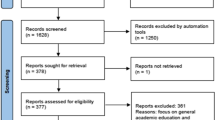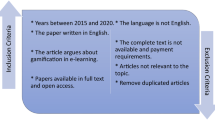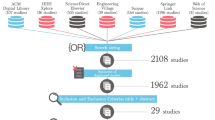Abstract
Digital games introduce an innovative means for teaching prosocial skills to students; however, the lack of proper personalization features in the games may result in the degradation of the learning process. This paper aims to study whether the performance of students in a prosocial game could be improved by an intelligent AI adaptation mechanism. To this end, a novel hybrid adaptation manager capable of assisting students playing prosocial games is presented. Our approach consists of a combination of two adaptation mechanisms that process personalization information both offline and in real-time. Both implementations are based on artificial intelligence techniques and adjust game content in order to increase the chances of players attaining the game’s specific learning objectives concerning prosocial skills. In particular, the online mechanism maintains a player engagement profile for game elements that are intended to represent the pedagogical practices of corrective feedback and positive reinforcement. On the other hand, offline adaptation matches players to game scenarios according to the players’ ability and the game scenarios’ ranking. The efficiency of the proposed adaptation manager as a tool for enhancing students’ performance in a prosocial game is demonstrated through a small-scale experiment, under real-time conditions in a school environment, using the prosocial game “Path of Trust.”











Similar content being viewed by others
References
Annetta, L. A., Cheng, M. T., & Holmes, S. (2010). Assessing twenty first century skills through a teacher created video game for high school biology students. Research in Science & Technological Education, 28(2), 101–114. https://doi.org/10.1080/02635141003748358.
Apostolakis, K., Psaltis, A., Stefanidis, K., Kaza, K., Thermos, S., Dimitropoulos, K., et al. (2016a). Exploring the prosociality domains of trust and cooperation, through single and cooperative digital gameplay in path of trust. International Journal of Serious Games, 3, 39–57. https://doi.org/10.17083/ijsg.v3i3.125.
Apostolakis, K. C., Kaza, K., Psaltis, A., Stefanidis, K., Thermos, S., Dimitropoulos, K., et al. (2016b). Path of trust: A prosocial co-op game for building up trustworthiness and teamwork. In A. De Gloria & R. Veltkamp (Eds.), Games and learning alliance (pp. 80–89). Cham: Springer International Publishing.
Appleton, J. J., Christenson, S. L., Kim, D., & Reschly, A. L. (2006). Measuring cognitive and psychological engagement: Validation of the student engagement instrument. Journal of School Psychology, 44(5), 427–445. https://doi.org/10.1016/j.jsp.2006.04.002.
Beckman, K., Apps, T., Bennett, S., & Lockyer, L. (2018). Conceptualising technology practice in education using Bourdieu’s sociology. Learning, Media and Technology, 43(2), 197–210. https://doi.org/10.1080/17439884.2018.1462205.
Bontchev, B. (2016). Adaptation in affective video games: A literature review. Cybernetics and Information Technologies, 16(3), 3–34.
Bontchev, B., & Vassileva, D. (2017). Affect-based adaptation of an applied video game for educational purposes. Interactive Technology and Smart Education, 14(1), 31–49. https://doi.org/10.1108/ITSE-07-2016-0023.
C.A.S.E.L. (2013). Effective Social and Emotional Learning Programs - Preschool and Elementary School Edition. Guide.
Chanel, G., Rebetez, C., Bétrancourt, M., & Pun, T. (2011, Nov). Emotion assessment from physiological signals for adaptation of game difficulty. IEEE Transactions on Systems, Man, and Cybernetics—Part A: Systems and Humans, 41 (6), 1052-1063. https://doi.org/10.1109/TSMCA.2011.2116000
Charles, D., McNeill, M., McAlister, M., Black, M., Moore, A., Stringer, K., et al. (2005). Player-centred game design: Player modelling and adaptive digital games. In Proceedings of DiGRA 2005 Conference: Changing Views—Worlds in Play, pp. 285–298.
Cheng, C.-H., & Su, C.-H. (2012). A game-based learning system for improving student’s learning effectiveness in system analysis course. Procedia-Social and Behavioral Sciences, 31, 669–675.
Dinçer, S., & Doganay, A. (2017). The effects of multiple-pedagogical agents on learners academic success, motivation, and cognitive load. Computers & Education, 111, 74–100.
Durlak, J. A., Weissberg, R. P., Dymnicki, A. B., Taylor, R. D., & Schellinger, K. B. (2011). The impact of enhancing students social and emotional learning: A meta-analysis of school-based universal interventions. Child Development, 82(1), 405–432.
Elo, A. E. (1978). The rating of chessplayers, past and present. New York: Arco Publishing.
Erhel, S., & Jamet, E. (2013). Digital game-based learning: Impact of instructions and feedback on motivation and learning effectiveness. Computers & Education, 67, 156–167.
Fredricks, J. A., Blumenfeld, P. C., & Paris, A. H. (2004). School engagement: Potential of the concept, state of the evidence. Review of Educational Research, 74(1), 59–109.
Gentile, D. A., Anderson, C. A., Yukawa, S., Ihori, N., Saleem, M., & Ming, L. K. (2009). The effects of prosocial video games on prosocial behaviors: International evidence from correlational, longitudinal, and experimental studies. Personality and Social Psychology Bulletin, 35(6), 752–763. https://doi.org/10.1177/0146167209333045.
Gilleade, K. M., Dix, A., & Allanson, J. (2005). Affective Videogames and Modes of Affective Gaming: Assist Me, Challenge Me, Emote Me (ACE). In DiGRA 2005—Proceedings of the 2005 DiGRA International Conference: Changing Views: Worlds in Play.
Hamari, J., Shernoff, D. J., Rowe, E., Coller, B., Asbell-Clarke, J., & Edwards, T. (2016). Challenging games help students learn: An empirical study on engagement, ow and immersion in game-based learning. Computers in Human Behavior, 54, 170–179.
Hunicke, R. (2005). The case for dynamic difficulty adjustment in games. In Proceedings of the 2005 acm sigchi international conference on advances in computer entertainment technology, New York, NY, USA: ACM, pp. 429–433.
Kawatsu, C., Hubal, R., & Marinier, R. P. (2018). Predicting students decisions in a training simulation: A novel application of trueskill. IEEE Transactions on Games, 10(1), 97–100. https://doi.org/10.1109/TCIAIG.2017.2680843.
Kaza, K., Psaltis, A., Stefanidis, K., Apostolakis, K. C., Dimitropoulos, K., & Daras, P. (2016). Body motion analysis for emotion recognition in serious games. In M. Antona & C. Stephanidis (Eds.), Universal access in human-computer interaction-interaction techniques and environments (pp. 33–42). Cham: Springer International Publishing.
Keltner, D., Kogan, A., Piff, P. K., & Saturn, S. R. (2014). The sociocultural appraisals, values, and emotions (SAVE) framework of prosociality: Core processes from gene to meme. Annual Review of Psychology, 65, 425–60. https://doi.org/10.1146/annurev-psych-010213-115054.
Kickmeier, M., Mattheiss, E., Steiner, M., & Albert, D. (2011). 01). A psycho-pedagogical framework for multi-adaptive educational games. IJGBL, 1, 45–58.
Koster, R. (2013). Theory of fun for game design (2nd ed.). California: O’Reilly Media Inc.
Lalmas, M., O’Brien, H., & Yom-Tov, E. (2014). Measuring user engagement (Vol. 6). Synthesis Lectures on Information Concepts, Retrieval, and Services. https://doi.org/10.2200/S00605ED1V01Y201410ICR038
Lavoué, E., Monterrat, B., Desmarais, M., & George, S. (2018). Adaptive gamification for learning environments. IEEE Transactions on Learning Technologies.
Law, E. L.-C., Kickmeier-Rust, M. D., Albert, D., & Holzinger, A. (2008). Challenges in the development and evaluation of immersive digital educational games. In A. Holzinger (Ed.), HCI and usability for education and work (pp. 19–30). Berlin, Heidelberg: Springer.
Li, B., & Riedl, M. O. (2010). An offline planning approach to game plotline adaptation. In AIIDE.
Lopes, R., & Bidarra, R. (2011). Adaptivity challenges in games and simulations: A survey. IEEE Transactions on Computational Intelligence and AI in Games, 3(2), 85–99.
M Steiner, C., Kickmeier, M., Mattheiss, E., & Albert, D. (2009). Undercover: Non-invasive, adaptive interventions in educational games. In Proceedings of 80Days’ 1st International Open Workshop on Intelligent Personalisation and Adaptation in Digital Educational Games.
Newmann, F. (1992). Student engagement and achievement in American Secondary Schools (p. 23). New York: Teachers College Press.
Nogueira, P. A., Rodrigues, R., & Oliveira, E. (2013). Real-time psychophysiological emotional state estimation in digital gameplay scenarios. In L. Iliadis, H. Papadopoulos, & C. Jayne (Eds.), Engineering applications of neural networks (pp. 243–252). Berlin, Heidelberg: Springer.
Ocumpaugh, J., Baker, R. S., & Rodrigo, M. M. T. (2012). Baker-Rodrigo observation method protocol 1.0 training manual. Quezon: Ateneo Laboratory for the Learning Sciences.
Plass, J. L., Homer, B. D., & Kinzer, C. K. (2015). Foundations of game-based learning. Educational Psychologist, 50, 258–284.
Psaltis, A., Apostolakis, K. C., Dimitropoulos, K., & Daras, P. (2018). Multimodal student engagement recognition in prosocial games. IEEE Transactions on Games, 10(3), 292–303. https://doi.org/10.1109/TCIAIG.2017.2743341.
Psaltis, A., Kaza, K., Stefanidis, K., Thermos, S., Apostolakis, K. C., Dimitropoulos, K., et al. (2016). Multimodal affective state recognition in serious games applications. 2016 IEEE International Conference on Imaging Systems and Techniques (IST), pp. 435–439.
Qin, H., Rau, P.-L. P., & Salvendy, G. (2010). Effects of different scenarios of game difficulty on player immersion. Interacting with Computers, 22(3), 230–239.
Star, K., Vuillier, L. & Deterding, S. (2016). D2.6 Prosocial Game design methodology. Technical Report, Prosocial Learn.
Streicher, A., & Smeddinck, J. D. (2016). Personalized and Adaptive Serious Games. In Entertainment Computing and Serious Games: International GI-Dagstuhl Seminar 15283, Dagstuhl Castle, Germany, July 5–10, 2015, Revised Selected Papers. Cham: Springer International Publishing, pp. 332–377. https://doi.org/10.1007/978-3-319-46152-6_14
Takahashi, T., Oyo, K., & Shinohara, S. (2009). A Loosely Symmetric Model of Cognition. In G. Kampis, I. Karsai, & E. Szathmáry (Eds.), Advances in Artificial Life. Darwin Meets von Neumann (pp. 238–245). Berlin, Heidelberg: Springer Berlin Heidelberg.
Van Oostendorp, H., Van der Spek, E., & Linssen, J. (2013). Adapting the complexity level of a serious game to the proficiency of players. In P. Escudeiro & C. de Carvalho (Eds.), Proceedings of the 7th european conference on games based learning, ecgbl 2013 (pp. 553-560). Academic Conferences and Publishing International Limited.
Weitze, C. L. (2014). Developing goals and objectives for gameplay and learning. In K. Schrier (Ed.), In learning, education and games: Curricular and design considerations (Vol. 1, pp. 225–249). Pittsburgh, PA: ETC Press.
Wouters, P., & Oostendorp, H. V. (2013). A meta-analytic review of the role of instructional support in game-based learning. Computers & Education, 60(1), 412–425.
Yang, T.-C., Hwang, G.-J., & Yang, S. J.-H. (2013). Development of an adaptive learning system with multiple perspectives based on students’ learning styles and cognitive styles. Journal of Educational Technology & Society, 16(4), 185–200.
Yannakakis, G. N., & Hallam, J. (2009). Real-time game adaptation for optimizing player satisfaction. IEEE Transactions on Computational Intelligence and AI in Games, 1(2), 121–133. https://doi.org/10.1109/TCIAIG.2009.2024533.
Author information
Authors and Affiliations
Corresponding author
Rights and permissions
About this article
Cite this article
Stefanidis, K., Psaltis, A., Apostolakis, K.C. et al. Learning prosocial skills through multiadaptive games: a case study. J. Comput. Educ. 6, 167–190 (2019). https://doi.org/10.1007/s40692-019-00134-8
Received:
Revised:
Accepted:
Published:
Issue Date:
DOI: https://doi.org/10.1007/s40692-019-00134-8




